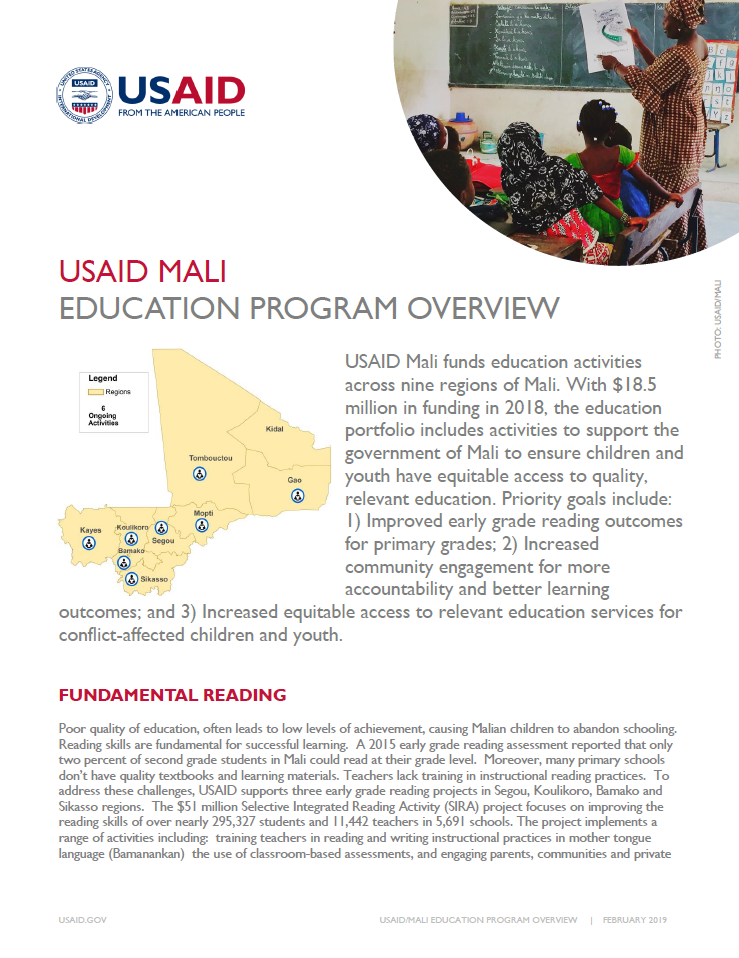Speeches Shim
Education Program Overview ![]() (pdf - 332k)
(pdf - 332k)
USAID Mali funds education activities across nine regions of Mali. With $18.5 million in funding in 2018, the education portfolio includes activities to support the government of Mali to ensure children and youth have equitable access to quality, relevant education. Priority goals include: 1) Improved early grade reading outcomes for primary grades; 2) Increased community engagement for more accountability and better learning outcomes; and 3) Increased equitable access to relevant education services for conflict-affected children and youth.
FUNDAMENTAL READING
Poor quality of education, often leads to low levels of achievement, causing Malian children to abandon schooling. Reading skills are fundamental for successful learning. A 2015 early grade reading assessment reported that only two percent of second grade students in Mali could read at their grade level. Moreover, many primary schools don’t have quality textbooks and learning materials. Teachers lack training in instructional reading practices. To address these challenges, USAID supports three early grade reading projects in Segou, Koulikoro, Bamako and Sikasso regions. The $51 million Selective Integrated Reading Activity (SIRA) project focuses on improving the reading skills of over nearly 295,327 students and 11,442 teachers in 5,691 schools. The project implements a range of activities including: training teachers in reading and writing instructional practices in mother tongue language (Bamanankan) the use of classroom-based assessments, and engaging parents, communities and private sector business to support early grade reading. The initiative will contribute to the Malian government’s ability to expand and sustain reforms to improve quality in the education sector.
The All Children Reading ensures effective, in-service training to teachers in order to improve reading instruction and provide quality education to children. This two-year $300,000 project aims to improve teaching and learning in grades one using mother tongue language instruction. The $308, 530 Your Child Reading and You, focuses on increasing family and community participation to support for early grade literacy by creating community libraries and offering teacher training.
EMERGENCY AND RECOVERY EDUCATION SUPPORT
The 2012 coup d’état and subsequent prolonged conflict in Northern Mali has weakened the educational system. Schools and educational equipment have been damaged or destroyed. Teachers and school administrators have abandoned their posts due to insecurity. To date, more than 500 schools in Northern Mali remain closed due to insecurity.
To assist the Malian government in restoring quality education services, USAID is implementing three projects in Northern regions of Mopti, Timbuktu, Kidal, Gao, Menaka, and Segou Regions. These projects address immediate education and social protection needs of the population; restore education infrastructure; support the development of human resources such as teachers; and address unique and emerging needs of the communities resulting from the protracted conflict.
The Equitable Access to Education project aims to ensure inclusive access to quality education in safe, secure environments for 100,000 girls and boys in conflict-affected areas. With a budget of $4.9 million, the project supports advocacy for the re-opening of schools; awareness-raising on rights to quality education; psychosocial training of teachers, accelerated learning centers, and establishment of school emergency action plans.
The $14.5 million Education Emergency Support Activity (EESA) aims to increase equitable access to basic education for 80,000 children through creating safe and functional learning spaces. EESA will mobilize communities to reopen schools, rehabilitate 250 schools, and construct an additional 60 classrooms. The project will also provide remedial instruction in 30 schools to make up for years of schooling lost due to conflict.
The $15.2 million Education Recovery Support Activity (ERSA) provides second chance educational opportunities for 10,500 out-of-school children aged 9 – 14 and youth aged 15 – 24 in Gao and Menaka regions. The ERSA project will establish nearly 300 accelerated learning centers, construct 150 classrooms and latrines, and establish 70 vocational training centers for out of school youth. Consequently, children and youth who have missed years of education can return to formal schools or develop skills that will allow them to earn incomes.
EDUCATION FOR CHILDREN WITH DISABILITIES
Persons with disabilities often live on the margins of society, deprived of access to public services including education. The World Health Organization estimates that two million Malians live with disabilities. USAID’s $300,000 Education for Persons with Disabilities project aims to increase the quality of primary education for children with disabilities in Timbuktu and Sikasso. Additionally, the project works closely with the Ministry of Education, communities, and schools to promote inclusive and peace education in communities affected by conflict. The project works to remove barriers to education for children with disabilities including school fees, transportation, improving accessibility of school environments, training teachers, providing assistive devices and medical care, and training family members to ensure that 100 children with disabilities will enroll and stay in school.


Comment
Make a general inquiry or suggest an improvement.